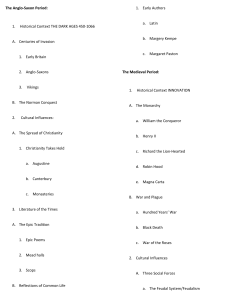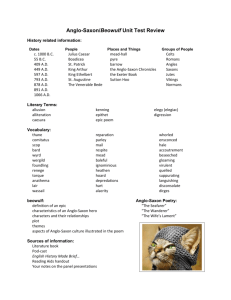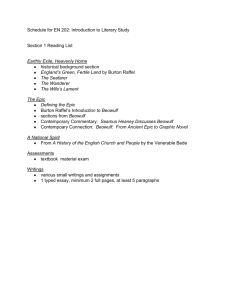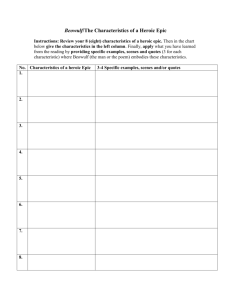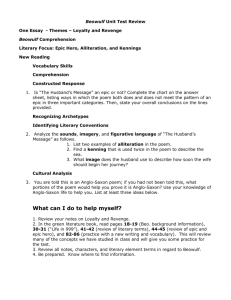Literary Terms - Nova Classical Academy
advertisement
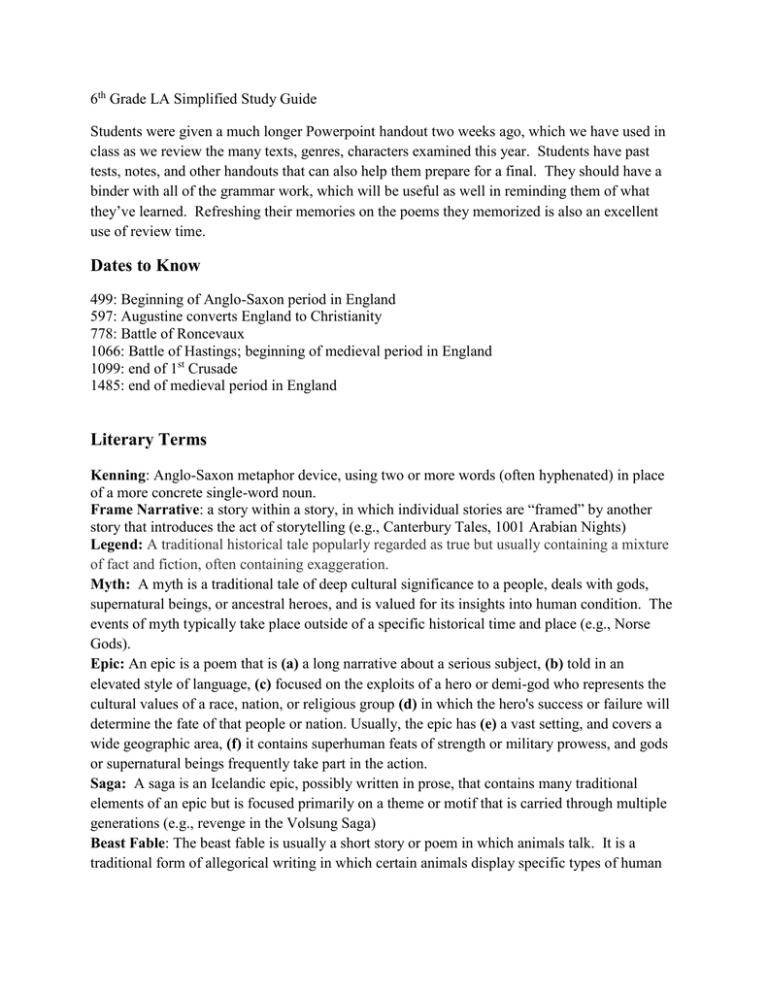
6th Grade LA Simplified Study Guide Students were given a much longer Powerpoint handout two weeks ago, which we have used in class as we review the many texts, genres, characters examined this year. Students have past tests, notes, and other handouts that can also help them prepare for a final. They should have a binder with all of the grammar work, which will be useful as well in reminding them of what they’ve learned. Refreshing their memories on the poems they memorized is also an excellent use of review time. Dates to Know 499: Beginning of Anglo-Saxon period in England 597: Augustine converts England to Christianity 778: Battle of Roncevaux 1066: Battle of Hastings; beginning of medieval period in England 1099: end of 1st Crusade 1485: end of medieval period in England Literary Terms Kenning: Anglo-Saxon metaphor device, using two or more words (often hyphenated) in place of a more concrete single-word noun. Frame Narrative: a story within a story, in which individual stories are “framed” by another story that introduces the act of storytelling (e.g., Canterbury Tales, 1001 Arabian Nights) Legend: A traditional historical tale popularly regarded as true but usually containing a mixture of fact and fiction, often containing exaggeration. Myth: A myth is a traditional tale of deep cultural significance to a people, deals with gods, supernatural beings, or ancestral heroes, and is valued for its insights into human condition. The events of myth typically take place outside of a specific historical time and place (e.g., Norse Gods). Epic: An epic is a poem that is (a) a long narrative about a serious subject, (b) told in an elevated style of language, (c) focused on the exploits of a hero or demi-god who represents the cultural values of a race, nation, or religious group (d) in which the hero's success or failure will determine the fate of that people or nation. Usually, the epic has (e) a vast setting, and covers a wide geographic area, (f) it contains superhuman feats of strength or military prowess, and gods or supernatural beings frequently take part in the action. Saga: A saga is an Icelandic epic, possibly written in prose, that contains many traditional elements of an epic but is focused primarily on a theme or motif that is carried through multiple generations (e.g., revenge in the Volsung Saga) Beast Fable: The beast fable is usually a short story or poem in which animals talk. It is a traditional form of allegorical writing in which certain animals display specific types of human behavior (the fox is clever, the bee is busy). It is a type of fable in which human behavior and weaknesses are subject to scrutiny by reflection into the animal kingdom. Romance: The medieval romance idealizes chivalry, the hero-knight and his noble deeds, the knight's love for his lady. It follows a knight who goes on a dangerous quest in settings that tend to be imaginary and vague and may involve supernatural elements. Quest: A quest is a journey towards a goal. Quests require great exertion on the hero’s part, as he proves his worth by overcoming many obstacles (internal or external). Quests typically require much travel. Other Fun Words: Flyting: a contest of wits and insults between two Germanic warriors, either as a prelude to battle or a replacement of battle. Each person tries to demonstrate his superior vocabulary, cleverness and bravery, usually by insulting the other’s lack of these qualities. Alliteratation: The repetition of consonant sounds, lovely alliteration holds poetic lines together in Anglo-Saxon poetry. Assonance: The repetition of vowel sounds, awesome assonance holds laisses together in Roland. Laisses: The word for a verse paragraph, or stanza, in the chanson de geste. Parallel laisses: Stanzas that repeat or describe the same scene in a chanson de geste but do so with slightly different wording. The effect is like a music video in which multiple perspectives are given to the same event in order to show that event’s importance and to slow the action down so the reader can dwell on its importance. Hallows: Holy objects, like the Grail or the lance, in Arthur stories. Trickster: A trickster is a god, goddess, spirit, man, woman, or anthropomorphic animal who plays tricks or otherwise disobeys normal rules and conventional behavior. Comitatus: Defined as loyalty, generosity and bravery, the comitatus represents the interwoven cultural bonds in Germanic tribes. Weregild: The value placed on every human being and every piece of property in the Salic Code. The payment of weregild was an important legal mechanism in early Germanic society; the other common form of legal reparation at this time was blood revenge. Camelot: King Arthur’s court, now associated with an idealized government based on virtue and unity. Scop: Ango-Saxon storyteller Jongleur: French medieval storyteller Chanson de Geste: Song of deeds, popular in medieval France Major Characters in Texts: Beowulf: Beowulf Breca Hrothgar Hygelac Wiglaf Shield Sheafson Ecgtheow Grendel Grendel’s Mother Dragon Unferth Norse Gods and Heroes: Ymir Buri Ginnungagap Yggdrasil Bifrost Odin, Ve, Villi Thor Loki Frey Tyr Balder The Norns Heimdall Hel 9 Norse Worlds Asgard Alfheim Vanaheim Midgard Jotumheim Svartalfaheim Muspelheim Niflheim Hel 1001 Arabian Nights Shahrazad Shahryar Ala-a-din Sinbad Wazir Ali Baba Arthur Arthur Lancelot Guenivere Merlin Song of Roland Charlemagne Roland Oliver Archbishop of Turin Ganelon Tristram Isolde Mordred The Lady of the Lake Marsiliun Blancardin Gabriel Robin Hood: Robin Hood Little John Will Stutely Friar Tuck Maid Marian Sheriff of Nottingham King (Henry/Richard) Grammar: Parts of Speech Articles Nouns Adjectives Prepositions Pronouns Adverbs Verbs (linking, action, and helping) Verbals Conjunctions Grammar: Other Words Antecedents Direct Objects Indirect Objects Subject Object of Preposition Modifier Predicate Nominative Predicate Adjective Poems Memorized this year Jabberwocky Beowulf (lines 1-50) Havamal: “Cattle die . . . .” Leave-Taking The Rooster St. Crispian Day Speech Prologue to the Canterbury Tales
